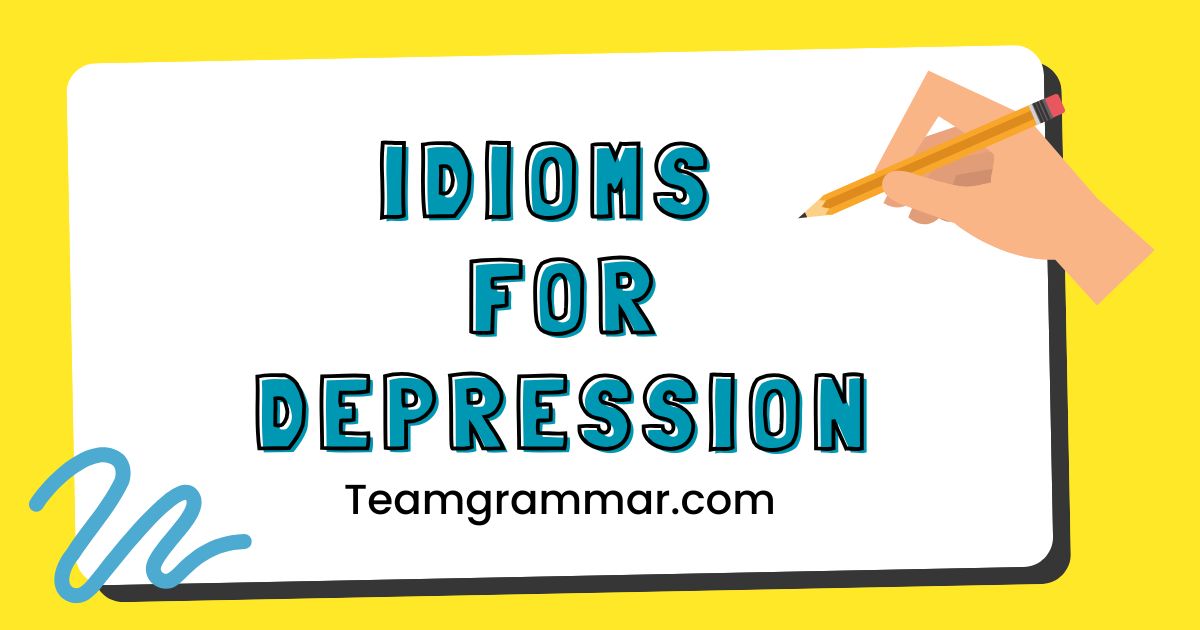27 Idioms for Depression: Understanding and Expressing Feelings
Depression is a complex and deeply personal experience, and finding the right words to express its nuances can be challenging. Idioms, with their figurative language and cultural context, offer a unique way to articulate the feelings associated with depression.
Understanding these idioms not only enriches your vocabulary but also provides a deeper insight into how English speakers conceptualize and communicate about mental health. This article explores a range of idioms related to depression, offering definitions, examples, and practical exercises to help you understand and use them effectively.
Whether you are a student, a teacher, or simply someone interested in language, this guide will provide valuable tools for expressing yourself and understanding others when discussing this sensitive topic.
Table of Contents
- Introduction
- Definition of Idioms for Depression
- Structural Breakdown of Idioms
- Types and Categories of Idioms for Depression
- Examples of Idioms for Depression
- Usage Rules for Idioms
- Common Mistakes When Using Idioms
- Practice Exercises
- Advanced Topics in Idiomatic Usage
- FAQ: Frequently Asked Questions
- Conclusion
Definition of Idioms for Depression
An idiom is a phrase or expression whose meaning cannot be understood from the ordinary meanings of the words in it. In other words, it’s a figurative expression where the overall meaning differs significantly from the literal meanings of its individual components.
Idioms related to depression are phrases that describe feelings, symptoms, or experiences associated with depression in a non-literal, often metaphorical way.
These idioms serve several important functions. First, they provide a shorthand way to communicate complex emotions and experiences.
Instead of detailing every symptom, a speaker can use an idiom to quickly convey a general state of mind. Second, idioms often carry cultural connotations, reflecting how a society understands and talks about mental health.
Finally, idioms can sometimes soften the impact of difficult topics, making them more approachable in conversation.
The classification of these idioms involves understanding their metaphorical basis. Many depression idioms draw on physical sensations, such as weight or darkness, to represent emotional states.
Others use metaphors related to weather, such as storms or clouds, to describe the fluctuating nature of mood. Recognizing these underlying metaphors is key to interpreting and using these idioms correctly.
Structural Breakdown of Idioms
Idioms, by their nature, defy typical grammatical analysis. They function as single units of meaning, even though they are composed of multiple words.
Understanding their structure involves recognizing that the individual words contribute to a collective meaning that is distinct from their literal definitions. The structure of idioms can vary, but certain patterns are common.
Many idioms follow a subject-verb-object structure, while others are prepositional phrases or even complete sentences. The key is that the entire phrase acts as a single semantic unit.
For example, in the idiom “to feel blue,” “feel” is a verb and “blue” is an adjective, but the meaning of the phrase isn’t simply about feeling a color; it represents sadness or depression.
Furthermore, idioms often resist grammatical modification. While you can sometimes change the tense of the verb (e.g., “He was feeling blue”), altering other elements can destroy the idiom’s meaning.
For example, saying “He was feeling greenish-blue” would likely not convey the intended meaning of sadness.
Here are some common structural patterns found in idioms related to depression:
- Verb + Adjective: feel blue, be down
- Verb + Noun: carry a heavy burden, fight a losing battle
- Prepositional Phrase: under a cloud, in the depths of despair
- Sentence-like Structures: have a dark cloud hanging over one’s head, be a shadow of one’s former self
Types and Categories of Idioms for Depression
Idioms for depression can be categorized based on the specific aspect of the experience they describe. This categorization helps in understanding the nuances of each idiom and using them appropriately.
Here are some common categories:
Idioms Describing Low Mood or Sadness
These idioms directly express feelings of sadness, unhappiness, or general low spirits. They are often the most straightforward way to convey a depressed mood.
Idioms Describing Lack of Energy or Motivation
Depression often manifests as a lack of energy, motivation, and interest in activities. These idioms capture this aspect of the experience.
Idioms Describing Emotional Burden or Weight
Many people experiencing depression feel weighed down by their emotions. These idioms use the metaphor of weight to describe this feeling of being burdened.
Idioms Describing Isolation or Withdrawal
Depression can lead to social isolation and a sense of being cut off from others. These idioms describe this aspect of the experience.
Idioms Describing Hopelessness or Despair
A key symptom of depression is a feeling of hopelessness and a lack of belief in a positive future. These idioms express this sense of despair.
Examples of Idioms for Depression
The following sections provide detailed examples of idioms related to depression, organized by category. Each example includes a definition and illustrative sentences.
Idioms Describing Feeling Down
These idioms are used to describe a general feeling of sadness or unhappiness. They are versatile and can be used in a variety of contexts.
The table below contains examples of idioms that describe feeling down, along with their meanings and example sentences.
| Idiom | Meaning | Example Sentence |
|---|---|---|
| Feel blue | To feel sad or depressed | She’s been feeling blue since she lost her job. |
| Down in the dumps | To feel sad and without energy | He’s been down in the dumps ever since his favorite team lost. |
| Have the blues | To feel sad or depressed, often associated with music | Listening to that song always gives me the blues. |
| In a funk | To be in a low mood or depressed state | I’ve been in a funk all week and can’t seem to shake it off. |
| Down in the mouth | To look sad or depressed | She looked down in the mouth when she heard the news. |
| A heavy heart | To feel sadness or sorrow | He left with a heavy heart, knowing he might not return. |
| Low spirits | To feel unhappy or depressed | The rainy weather always puts me in low spirits. |
| Under the weather | To feel unwell or slightly depressed | I’ve been feeling under the weather lately and haven’t been very productive. |
| In the doldrums | To be in a state of inactivity or depression | The project has been in the doldrums since the funding was cut. |
| Out of sorts | To feel slightly unwell or unhappy | She’s been feeling out of sorts since the argument with her friend. |
| To have a long face | To look sad or disappointed | Why do you have such a long face? What happened? |
| To be crestfallen | To be disappointed and dejected | He was crestfallen when he didn’t get the promotion. |
| To be in the dumps | To be in a state of low spirits | She’s been in the dumps since her vacation was canceled. |
| To be downcast | To be disheartened or depressed | He looked downcast after failing the exam. |
| To wear a melancholy air | To have a sad or pensive demeanor | She always wears a melancholy air when she talks about her childhood. |
| To be disheartened | To lose enthusiasm and hope | He was disheartened by the constant criticism. |
| To be in a blue funk | To be in a state of depression or unhappiness | After the breakup, she was in a blue funk for weeks. |
| To be in the pits | To be in a very bad or depressed state | He felt like he was in the pits after losing his job. |
| To be swimming in sorrow | To be overwhelmed by sadness | After the loss of her pet, she was swimming in sorrow. |
| To be weighed down with grief | To be burdened by intense sadness | She was weighed down with grief after the funeral. |
| To be choked with sadness | To feel overwhelmed by sorrow, often to the point of being unable to speak | She was choked with sadness as she remembered her late husband. |
| To be steeped in melancholy | To be deeply immersed in a state of sadness and pensive reflection | The old house was steeped in melancholy, filled with memories of the past. |
| To be drowning in despair | To feel completely overcome by hopelessness and sadness | After failing to find a job for months, he felt like he was drowning in despair. |
Idioms Describing Lack of Energy
These idioms capture the feeling of fatigue, lack of motivation, and general apathy that often accompany depression. They are useful for expressing the physical and mental exhaustion associated with the condition.
The table below contains examples of idioms that describe lack of energy, along with their meanings and example sentences.
| Idiom | Meaning | Example Sentence |
|---|---|---|
| Burned out | To feel exhausted and unable to function effectively due to stress | After working non-stop for months, she was completely burned out. |
| Run out of steam | To lose energy or enthusiasm | The project ran out of steam after the initial excitement wore off. |
| Dragging one’s feet | To do something slowly and without enthusiasm | He’s been dragging his feet on the project because he’s not interested in it. |
| Can’t be bothered | To lack the motivation to do something | I can’t be bothered to cook tonight; let’s just order takeout. |
| Lethargic | Feeling tired and without energy | The medication made her feel lethargic and unable to concentrate. |
| To feel sapped of energy | To feel completely drained and without any vitality | The illness left him feeling sapped of energy. |
| To be running on empty | To be operating with very little energy or resources left | After the sleepless nights, she was running on empty. |
| To be devoid of vitality | To lack energy and enthusiasm | He seemed devoid of vitality after the long illness. |
| To be sapped of strength | To have one’s physical or emotional strength diminished | The emotional turmoil had sapped her of strength. |
| To feel like a wet blanket | To lack energy and enthusiasm, and to dampen the spirits of others | He felt like a wet blanket at the party, unable to enjoy himself. |
| To be in a slump | To be in a period of reduced activity or performance | The team has been in a slump lately, losing every game. |
| To be idling | To be inactive or not working | Since his retirement, he’s been idling at home. |
| To be stagnating | To be in a state of inactivity or slow progress | The project is stagnating due to lack of funding. |
| To lack drive | To not have the motivation or ambition to pursue goals | He lacks the drive to succeed in a competitive environment. |
| To have no get-up-and-go | To lack energy and enthusiasm | She has no get-up-and-go these days, preferring to stay in bed. |
| To be languid | To be slow and relaxed, often to the point of inactivity | She felt too languid to even get out of bed. |
| To be listless | To lack energy and enthusiasm; to be without interest | He was listless and uninterested in any activities. |
| To be apathetic | To show or feel no interest, enthusiasm, or concern | She had become apathetic towards her job. |
| To be in a fog | To feel confused and lacking in clarity or energy | He was in a fog all day, unable to concentrate on anything. |
| To be sapped | To have one’s energy or vitality gradually drained away | The heat had sapped all her energy. |
Idioms Describing Emotional Burden
These idioms use the metaphor of weight to describe the feeling of being burdened by emotions. They are effective for conveying the sense of heaviness and oppression that often accompanies depression.
The table below contains examples of idioms that describe emotional burden, along with their meanings and example sentences.
| Idiom | Meaning | Example Sentence |
|---|---|---|
| Carry a heavy burden | To bear a significant emotional or psychological weight | She’s been carrying a heavy burden since her husband’s death. |
| Weighed down | To be burdened by something, either physically or emotionally | He felt weighed down by the responsibilities of his new job. |
| A weight on one’s shoulders | To have a significant worry or responsibility | The upcoming exam is a weight on my shoulders. |
| Heavy-hearted | Feeling sad or burdened | She felt heavy-hearted as she said goodbye to her family. |
| To shoulder a burden | To bear a responsibility or problem | He had to shoulder the burden of supporting his family. |
| To carry the weight of the world on one’s shoulders | To feel responsible for everything and everyone, leading to stress and anxiety | She felt like she was carrying the weight of the world on her shoulders. |
| To be burdened with sorrow | To be weighed down by grief and sadness | She was burdened with sorrow after losing her mother. |
| To be laden with care | To be filled with worries and anxieties | His face was laden with care as he considered the difficult decision. |
| To bear the brunt of | To suffer the main impact of something unpleasant | The small business bore the brunt of the economic recession. |
| To groan under the weight of | To struggle under a heavy burden | The company was groaning under the weight of debt. |
| To be crushed by | To be overwhelmed by a burden or sorrow | She was crushed by the news of the accident. |
| To be oppressed by | To be weighed down and controlled by something | He felt oppressed by the constant pressure to succeed. |
| To be saddled with | To be burdened with an unwanted responsibility | He was saddled with debt after the business failed. |
| To be weighed down by worry | To be burdened by anxiety and concern | She was weighed down by worry about her children. |
| To have a millstone around one’s neck | To have a heavy burden that is difficult to get rid of | The failing business was a millstone around his neck. |
| To be under a cloud | To be under suspicion or in disgrace | He has been under a cloud since the scandal broke. |
| To have a pall over | To have a dark or gloomy atmosphere | The news cast a pall over the entire celebration. |
| To be in the shadow of | To be overshadowed by something negative | The town was in the shadow of the factory closure. |
| To have a weight hanging over one’s head | To have a persistent worry or problem | The threat of layoffs was a weight hanging over their heads. |
| To have a dark cloud hanging over one’s head | To have a persistent problem or worry that causes anxiety | She felt like she had a dark cloud hanging over her head after the diagnosis. |
Idioms Describing Isolation
These idioms describe the feeling of being alone, disconnected from others, or withdrawn from social interactions. They are useful for expressing the sense of loneliness and alienation that can accompany depression.
The table below contains examples of idioms that describe isolation, along with their meanings and example sentences.
| Idiom | Meaning | Example Sentence |
|---|---|---|
| Feel isolated | To feel alone and disconnected from others | She felt isolated after moving to a new city. |
| Cut off | To be separated from others or from communication | They were cut off from the rest of the world during the storm. |
| Withdraw into one’s shell | To become isolated and avoid social interaction | After the criticism, he withdrew into his shell. |
| Keep to oneself | To avoid socializing and remain private | He keeps to himself and doesn’t participate in social events. |
| A lone wolf | Someone who prefers to be alone and independent | She’s always been a lone wolf, preferring her own company. |
| To be in a world of one’s own | To be detached from reality and absorbed in one’s thoughts | He seemed to be in a world of his own, oblivious to what was happening around him. |
| To be walled off | To be isolated or separated from others, either physically or emotionally | She felt walled off from her family due to the misunderstanding. |
| To be detached | To be emotionally distant and uninvolved | He seemed detached from the situation, showing little emotion. |
| To be adrift | To be without direction or purpose, often leading to feelings of isolation | After losing his job, he felt adrift and unsure of what to do next. |
| To be sequestered | To be isolated or hidden away from others | The jury was sequestered during the trial. |
| To be ostracized | To be excluded from a group or society | She was ostracized after expressing unpopular opinions. |
| To be shunned | To be deliberately avoided by others | He was shunned by his former friends after the betrayal. |
| To be on the fringes | To be on the margins of a group or society | They lived on the fringes of society, isolated from mainstream culture. |
| To be a recluse | To live in seclusion and avoid contact with people | He became a recluse after the traumatic event. |
| To be alienated | To feel estranged or isolated from others | She felt alienated from her peers due to her different interests. |
| To be a stranger in one’s own land | To feel out of place and disconnected from one’s surroundings | Having lived abroad for so long, he felt like a stranger in his own land. |
| To be a fish out of water | To feel uncomfortable and out of place in a particular situation | He felt like a fish out of water at the formal dinner. |
| To be on an island | To be isolated and alone | He felt like he was on an island, with no one to turn to. |
| To be in solitary confinement | To be completely isolated from others | The prisoner was placed in solitary confinement. |
| To be marooned | To be abandoned or isolated in a remote place | They were marooned on the deserted island. |
Idioms Describing Hopelessness
These idioms express the feeling of despair, lack of hope, and a belief that things will not improve. They are useful for conveying the profound sense of pessimism that often accompanies depression.
The table below contains examples of idioms that describe hopelessness, along with their meanings and example sentences.
| Idiom | Meaning | Example Sentence |
|---|---|---|
| At the end of one’s rope | To have no more patience or resources to deal with a difficult situation | She was at the end of her rope after dealing with the constant problems. |
| See no light at the end of the tunnel | To not see any sign of improvement or resolution to a difficult situation | He saw no light at the end of the tunnel and felt like giving up. |
| Give up the ghost | To stop trying or to die | The old car finally gave up the ghost after years of service. |
| Lost cause | Something that is hopeless and cannot be achieved | Trying to convince him to change his mind is a lost cause. |
| In despair | Feeling a complete loss of hope | She was in despair after receiving the bad news. |
| To be devoid of hope | To lack any optimism or positive expectations | He felt devoid of hope after the series of failures. |
| To be in the depths of despair | To be in a state of extreme hopelessness | She was in the depths of despair after losing her job and her home. |
| To lose heart | To lose courage or enthusiasm | He lost heart after the initial setbacks. |
| To be in a downward spiral | To be in a situation that is rapidly getting worse | The company was in a downward spiral due to poor management. |
| To hit rock bottom | To reach the lowest point in a difficult situation | He hit rock bottom when he lost everything he owned. |
| To be in a hopeless situation | To be in a situation with no prospect of success | They were in a hopeless situation, with no resources and no way out. |
| To have no prospect of success | To have no chance of achieving a desired outcome | The project had no prospect of success due to lack of funding. |
| To be a hopeless case | To be someone who is unlikely to improve or succeed | The doctors said he was a hopeless case, but he defied their expectations. |
| To be on a one-way street to nowhere | To be heading towards a dead end or failure | He felt like he was on a one-way street to nowhere with his current job. |
| To see no way out | To not be able to find a solution or escape from a difficult situation | She saw no way out of her financial problems. |
| To be staring into the abyss | To be facing a situation that is dark, dangerous, and potentially destructive | He felt like he was staring into the abyss after the tragic event. |
| To be on the brink of despair | To be very close to feeling completely hopeless | She was on the brink of despair after the series of setbacks. |
| To be at wit’s end | To be so worried or frustrated that one does not know what to do next | She was at her wit’s end trying to solve the problem. |
| To feel like the walls are closing in | To feel trapped and overwhelmed by a difficult situation | He felt like the walls were closing in as the deadline approached. |
| To reach a dead end | To come to a point where no further progress is possible | They reached a dead end in their investigation. |
Usage Rules for Idioms
Using idioms correctly requires understanding their specific meanings and contexts. While idioms add color and expressiveness to language, misusing them can lead to confusion or miscommunication.
Here are some key rules to keep in mind:
- Understand the meaning: Always be sure you know the precise meaning of an idiom before using it. Dictionaries and online resources can be helpful.
- Consider the context: Idioms are often informal and may not be appropriate for all situations. Consider your audience and the tone of the conversation.
- Use the correct form: Idioms have fixed forms, and changing the words can alter or destroy their meaning. Pay attention to the exact wording.
- Be aware of cultural differences: Idioms can be culturally specific, and some may not be understood by speakers from different backgrounds.
- Don’t overuse idioms: While idioms can enhance your language, using too many can make your speech sound unnatural or contrived.
Furthermore, be mindful of the nuances of each idiom. Some idioms are more intense or dramatic than others.
For example, “feeling blue” is a relatively mild expression of sadness, while “in the depths of despair” conveys a much more profound sense of hopelessness. Choose idioms that accurately reflect the intensity of the emotion you want to express.
Common Mistakes When Using Idioms
Misusing idioms is a common mistake among English learners. Here are some frequent errors and how to avoid them:
- Literal interpretation: Interpreting an idiom literally instead of understanding its figurative meaning.
- Incorrect: “He was really feeling blue, so I gave him a blue pen.”
- Correct: “He was really feeling blue, so I tried to cheer him up.”
- Incorrect word choice: Substituting words in an idiom, which changes its meaning.
- Incorrect: “She was down in the buckets.”
- Correct: “She was down in the dumps.”
- Using the wrong tense: Not using the correct verb tense within the idiom.
- Incorrect: “He will feel blue yesterday.”
- Correct: “He felt blue yesterday.”
- Overusing idioms: Using too many idioms in a single conversation, making it sound unnatural.
- Avoid: “I’ve been feeling blue, down in the dumps, and under the weather all week.”
- Better: “I’ve been feeling quite sad and unwell this week.”
Another common mistake is using idioms in inappropriate contexts. For example, using a very informal idiom in a formal presentation can be jarring.
Always consider your audience and the situation when choosing idioms.
Practice Exercises
Test your understanding of idioms for depression with the following exercises.
Exercise 1: Fill in the blanks with the correct idiom.
Choose from the following idioms: feeling blue, down in the dumps, heavy heart, burned out, at the end of my rope.
| Question | Answer |
|---|---|
| 1. After months of working long hours, she was completely __________. | burned out |
| 2. He’s been __________ since his favorite team lost the championship. | down in the dumps |
| 3. She left with a __________, knowing she might not see him again. | heavy heart |
| 4. I’ve been __________ all week and can’t seem to shake it off. | feeling blue |
| 5. I’m __________ dealing with these constant problems. | at the end of my rope |
| 6. After failing the exam, he was really __________. | feeling blue |
| 7. She’s had a __________ ever since her cat died. | heavy heart |
| 8. The constant stress from work left him completely __________. | burned out |
| 9. With all the setbacks, I feel like I’m __________. | at the end of my rope |
| 10. He’s been __________ ever since he lost his job. | down in the dumps |
Exercise 2: Match the idiom to its meaning.
| Idiom | Meaning |
|---|---|
| 1. Carry a heavy burden | a. To lose energy or enthusiasm |
| 2. Run out of steam | b. To be isolated and avoid social interaction |
| 3. Withdraw into one’s shell | c. To bear a significant emotional weight |
| 4. See no light at the end of the tunnel | d. To not see any sign of improvement |
Answers:
| Idiom | Meaning |
|---|---|
| 1. Carry a heavy burden | c. To bear a significant emotional weight |
| 2. Run out of steam | a. To lose energy or enthusiasm |
| 3. Withdraw into one’s shell | b. To be isolated and avoid social interaction |
| 4. See no light at the end of the tunnel | d. To not see any sign of improvement |
Exercise 3: Rewrite the following sentences using idioms.
1. She is feeling very sad since her friend moved away.
Answer: She’s been feeling blue since her friend moved away.
2. He is very tired and lacks motivation to work.
Answer: He’s burned out and can’t be bothered to work.
3. They don’t see any improvement in their financial situation.
Answer: They see no light at the end of the tunnel in their financial situation.
4. After the criticism, he became isolated and avoided people.
Answer: After the criticism, he withdrew into his shell.
5. She feels responsible for everyone’s problems.
Answer: She feels like she’s carrying the weight of the world on her shoulders.
Advanced Topics in Idiomatic Usage
For advanced learners, idiomatic usage can extend beyond simple comprehension and application. Here are some advanced topics to explore:
- Idiomatic variation: Some idioms have regional or dialectal variations. Understanding these variations can help you communicate more effectively with diverse audiences.
- Historical context: Many idioms have interesting historical origins. Researching the history of an idiom can provide deeper insights into its meaning and usage.
- Literary use of idioms: Authors often use idioms creatively to add depth and nuance to their writing. Analyzing how idioms are used in literature can enhance your understanding of both language and literature.
- Idioms in translation: Translating idioms from one language to another can be challenging, as a direct translation often doesn’t make sense. Understanding the cultural context of idioms is crucial for accurate translation.
- Creating new idioms: While most idioms are established phrases, language is constantly evolving. Pay attention to how new idioms emerge and spread in contemporary language.
Furthermore, consider the role of idioms in shaping cultural perceptions of mental health. The metaphors used in depression idioms can influence how people understand and respond to the condition.
By critically examining these metaphors, we can gain a deeper understanding of the social and cultural dimensions of mental health.
FAQ: Frequently Asked Questions
Conclusion
Idioms provide a rich and expressive way to communicate about depression. By understanding the meanings, structures, and usage rules of these idioms, you can enhance your vocabulary and gain a deeper appreciation for the nuances of language.
Whether you are describing your own feelings or trying to understand someone else’s experience, idioms can be a valuable tool for expressing the complexities of depression. Continue to explore and practice using these idioms, and you will find yourself better equipped to communicate about this sensitive and important topic.







